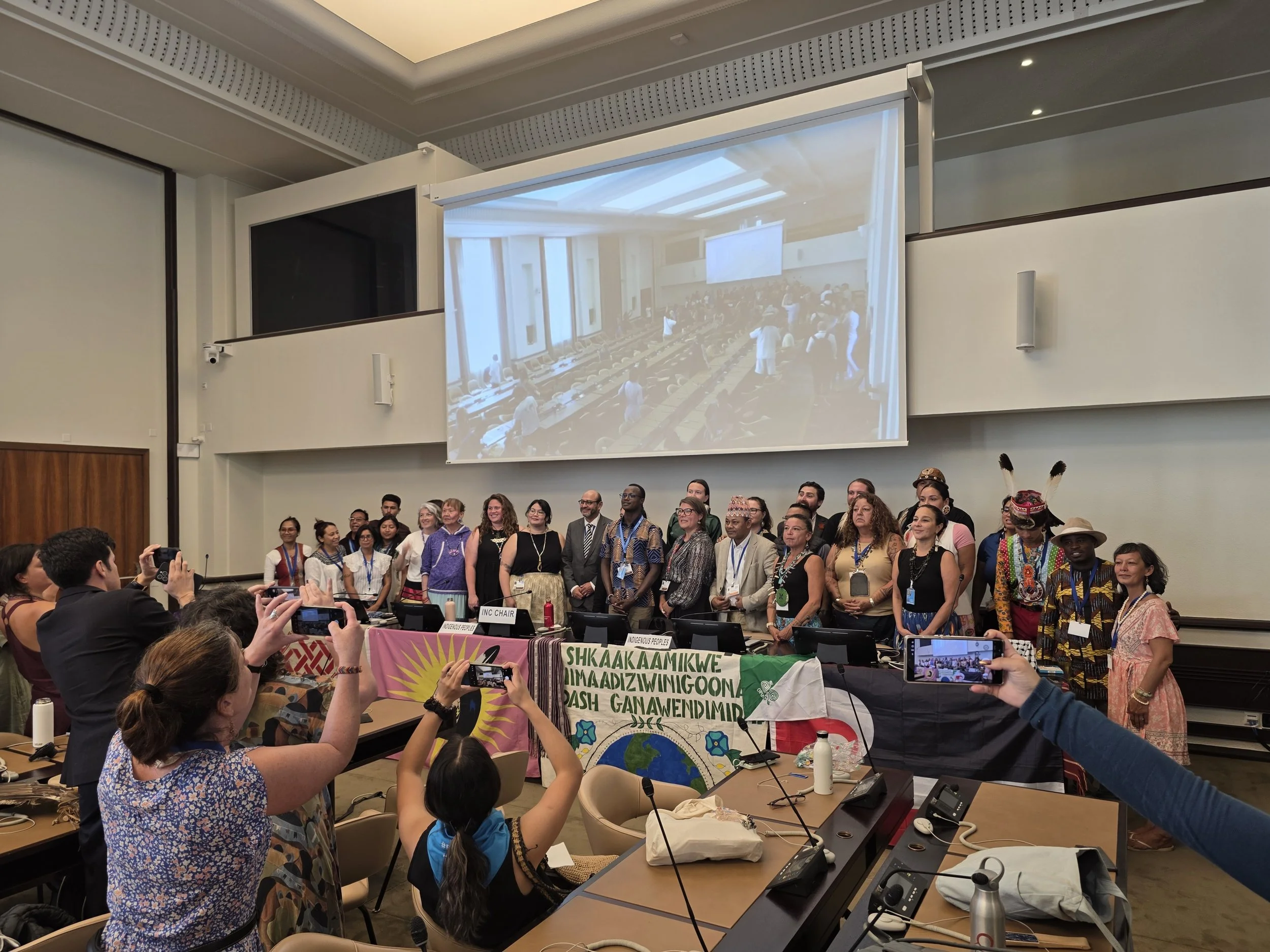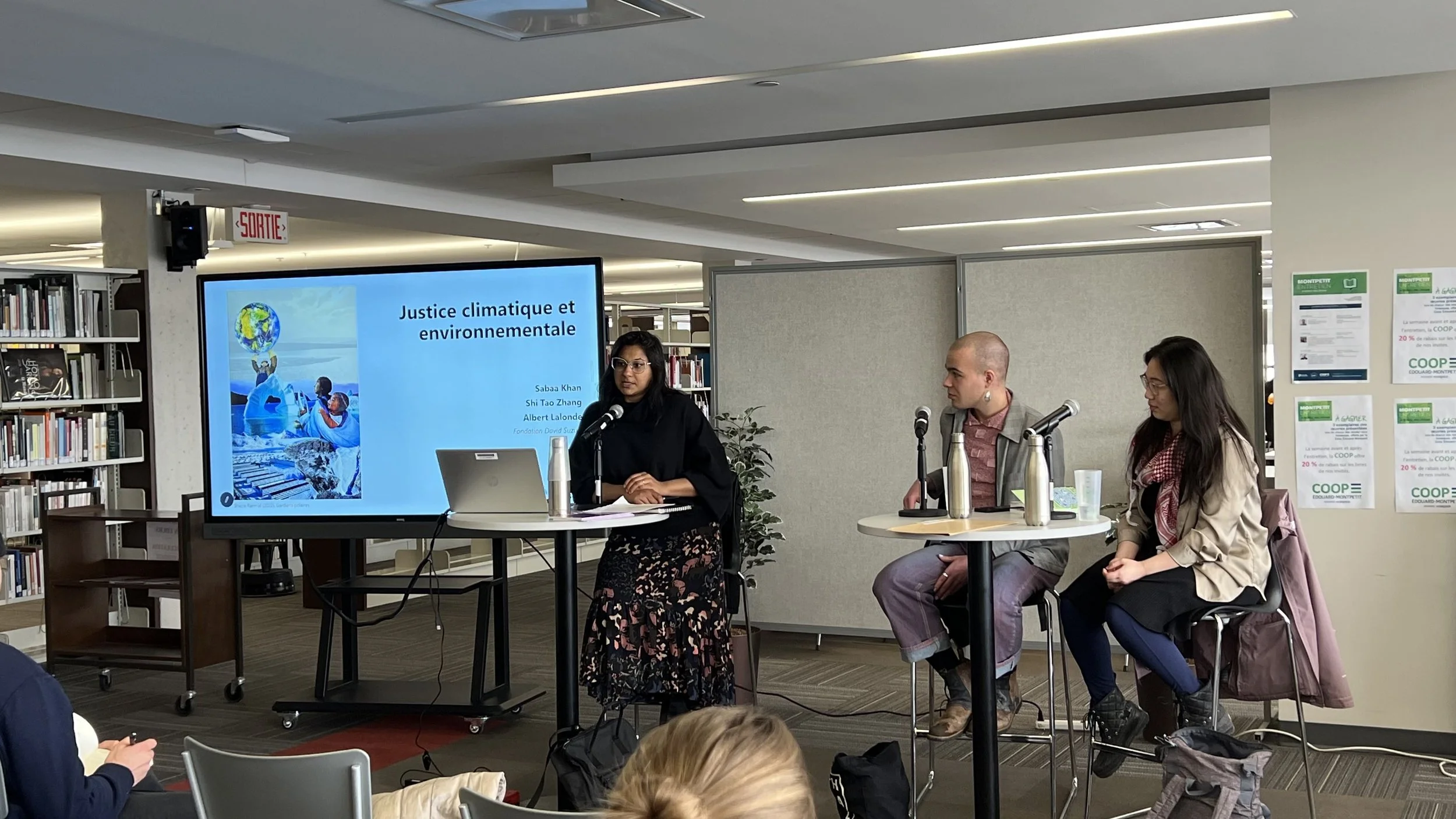Sabaa Khan
… is working at the forefront of climate, trade and Indigenous rights.
As the David Suzuki Foundation (DSF)’s Director General for Quebec and Atlantic Canada and national Climate Director, Sabaa Khan brings an equity lens across the multiple climate files she oversees, including:
Clean Economy & Climate Governance, which covers all of DSF’s federal and provincial government-facing and trade-related work, including federal and international laws, regulations, policies and investments which can accelerate decarbonization, and are designed and implemented to uphold human and Indigenous rights;
Climate Change and Rights, where DSF focuses its environmental justice work, and has included partnering with the Canadian Coalition for Environmental and Climate Justice on the federal environmental racism bill, and organizing with Québec ENGOs and the Mohawk Council of Kahnawake against the rushed approval of the Swedish-owned Northvolt battery plant on ancestral and environmentally sensitive lands;
Energy Horizons, focused on reducing emissions from upstream (industry) and downstream (consumer) energy production and usage, including advocacy, research and mobilization on issues such as LNG development, plastic pollution, and supporting energy sovereignty for First Nations;
Right now, DSF is reevaluating their approach to Indigenous engagement across all of their programs with a goal of deepening those relationships. In Quebec, DSF is expanding public awareness and engagement on environmental justice issues impacting the northern regions, where they’re establishing relationships with the Institut nordique du Québec, and working in allyship with the Inuit Circumpolar Council and the global Indigenous Peoples’ Caucus, on the Plastics Treaty.
On the international side, Khan is drawing on her background as a trade and environmental lawyer to think about the ways that Indigenous rights and climate justice principles can be embedded in the multiple trade negotiations Canada will be engaging in over the next few years, including the next free trade agreement with the U.S. and Mexico. Compared to trade negotiations in the recent past, “people are tuned into the trade and tariffs issue, there is more energy there” and possibilities for advocacy from a climate perspective. “So just thinking about coalition building on global and regional economic reform. I think that there is something that could be very promising there.”
On the difference between working with First Nation governments, and communities:
“I think that it's really important to distinguish: there is a difference between First Nations communities and FN governing bodies created under colonial structures (the Indian Act). There is also a difference between governing bodies recognized under Canadian (colonial) law, and traditional governance structures that predate Canada. Building relations with communities is different from building relations with band councils. At the end of the day, we lobby governments – non-Indigenous and Indigenous – in our work to uphold environmental human rights and protect human health for all communities.”
Photo: International Indigenous Peoples' Forum on Plastics (IIPFP) press conference, Geneva 2025.
On the importance of growing the Canadian Coalition for Environmental and Climate Justice:
Photo: DSF strategic retreat, Vancouver, 2025.
“The environmental justice legislation and Ingrid Waldron’s work, it really created spaces for wider collaboration. We did originally plan for the implementation strategy for C-226 to be part of our work, and we are monitoring that, and keeping an eye on it. I think there are key moments to weigh in. For communities, what will be important is having contextualized agreements with the federal government. DSF can work with other ENGOs to help amplify communities' demands in that regard. There is opportunity for engagement there, but it needs to be coalition-led. It needs to really expand. Within the ENGOs themselves, work on environmental racism is only just emerging. It’s worth thinking about, what can the climate movement do better, in terms of being an entry point for engagement with equity-deserving groups?”
On exploring climate compensation and supporting Indigenous communities in Quebec:
“So we're doing some research on having climate compensation legislation rolled out in Québec, the same way it has been in certain US states. We haven't engaged with any First Nations partners on that yet, because it's in its early stages. But definitely, our intention is to share our preliminary findings with our network of allies in Québec, and see if there is interest in expanding engagement on this kind of systemic approach to cost recovery. I definitely think we need to strengthen collaboration in Québec between environmental NGOs and Indigenous nations on conservation and climate solutions. And funders can play a role there, because there are many gaps in Quebec right now.”
Photo: Sabaa Khan, Albert Lalonde and Shi Tao Zhang deliver a conference on environmental justice at CEGEP Édouard Montpetit, 2025.
On how trade negotiations can embed climate principles:
“When I came into DSF, I really wanted to see how to weave trade into our work, having done a substantial amount of work on trade and environment linkages in the EU and North American contexts. With global public concern centered now on tariffs, I think it's time to advocate for a new ‘trade & climate’ paradigm in general – we don't have to go for an incremental improvement of the USMCA, we can imagine something broader. Environment and Climate Change Canada (ECCC) does not lead trade negotiations, Global Affairs Canada does, so we have to work to ensure that environmental concerns are top of mind. Any kind of work in developing a climate-supporting trade regime, any kind of research and ideas and modeling around that would probably be very beneficial to ECCC and GAC. I'm hoping that we can do some advocacy around that.”
Photo: Melissa Mollen-Dupuis launches the Forest Ambassadors program, 2024.
On how carbon markets can support climate justice principles in Canada:
“It’s an international reality. They're going to keep exploding, and are getting bigger – the offsets market is valued at over $1 trillion annually. California has an equity component to their carbon market because a part of the revenues have to go to environmental justice communities. Quebec doesn't have anything like that. So I think there's space in finance to look at how revenue coming in through carbon markets and sustainable finance revenue is actually going towards equity seeking groups.”
Photo: Severn Cullis-Suzuki, Root for Nature exhibition, 2024.





